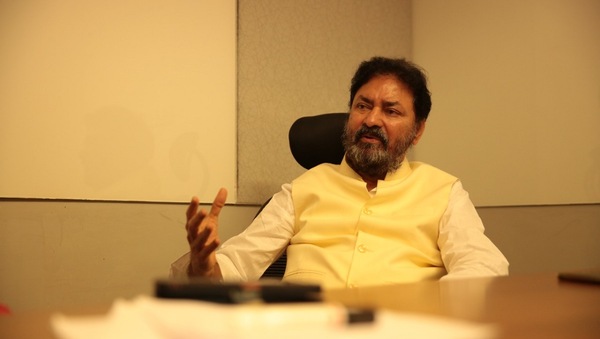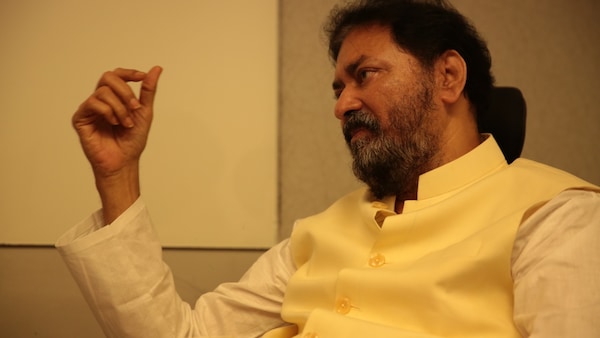Exclusive! Ananda Chakrapani: I'm hungry to prove myself as a versatile actor
The actor, recently seen in the OTT show Unheard, has proven his worth in films like Mallesham, Vakeel Saab, Naandhi, World Famous Lover and Anaganaga O Athidhi

Last Updated: 09.27 PM, Sep 21, 2021
Character actor Ananda Chakrapani may have shot to prominence after his heartfelt portrayal as Narasimhulu in Mallesham (the biopic of Padmasri-award winner Telangana weaver Chintakindi Mallesham) but his first brush with acting dates back to the late 80s for B Narsing Rao's award-winning film Daasi. Though he was associated with another film titled Chitikela Pandiri later, he had to drift towards ad-filmmaking for livelihood. Luck eluded him for long in films and his acting ambitions had nearly come to a standstill before director Raj Rachakonda unexpectedly cast him in Mallesham in 2019.
All it took was this one opportunity for the tide to swing in his favour and he's now lost count of the number of projects he's part of. If this isn't a success story, then what else is it? The veteran's victorious march continues with Disney+ Hotstar's show Unheard and he'll also be seen in this week's theatrical release, Sekhar Kammula's Love Story. In a conversation with OTTplay, Ananda Chakrapani talks about his early years in the film industry, Unheard and the many experiences that shaped him as an actor.
In Unheard, you play a jailer, Satyanarayana, torn between his duties and the guilt of doing injustice to the sacrifices of fellow citizens in the freedom struggle. What was it like to head back to a different era and look at the freedom struggle through his eyes?
Interestingly, I was the eldest person on the sets of Unheard. Though I didn't live through the pre-Independence era, I have read and heard a lot about the social, political situations prevailing back then. I have a good understanding of the times. The show takes audiences through the early 1900s and the time when Hyderabad was still ruled by the Nizams, while the entire country was set free. Freedom must have been very special and priceless for those who lived in such times because it came after nearly two centuries of struggle. However, an average Hyderabadi didn't have that luxury and it's hard to imagine their plight when they have no hope and in contrast, a majority of the country is in a celebratory mood. Moreover, the show is narrated through fictional characters. Given the fact that I understood this conflict on a psychological level, I was able to play my part confidently.
Do you see Unheard as a welcome departure from the staple father roles that you are offered film after film?
Definitely! The show is driven by the actors' performances. Unlike regular stories, Unheard is strung together by conversations between a few people holding contrasting beliefs. Most of the conversations unfold at a single location and revolve around three characters at best. It's very tough to pull it off on a filmmaking level and also from the perspective of actors. The prospect of keeping an audience engaged in the proceedings is challenging and it can't happen without good performances. It not only brought the best out of me but also our co-actors. They truly excelled in their characters.
Unheard, as you described was a challenge in terms of execution, but it was helmed by a first-time director with very little practical experience in the industry. In your opinion, what helped him pull this off?
KV Aditya is a voracious reader, has authored a few books and most importantly, has a nuanced understanding and passion for history. His ideas and outlook of the world are vastly different from the average common man. He has a great urge to learn, seek answers from the past. When someone with such great conviction for his story makes something, it is bound to shape up well. Aditya is extremely clear about what he wants to tell, the characters and the execution were naturally seamless.

How difficult is it to distinguish yourself as an actor when you are more or less stereotyped as a father figure?
On a paper level, I might be playing a father in most of my films but one must pay heed to the fact that no two fathers are the same. Every character comes with a different set of quirks. Even though the director may offer a brief about the character in every film, it's the actor's responsibility to understand its subtext. You must know if he's a frustrated soul, talks less or more, humble or not and his other defining traits - these aspects change from film to film and an actor must notice these little details carefully if he has to make a mark.
While you began your career with B Narsing Rao's Daasi in the 80s, it took a lot of professional struggle (and fame after your role in Mallesham) to reach where you are today. Have all those setbacks matured you as an actor?
Life experiences are invaluable for an actor to perform well. When you observe, go through challenges, struggles on a personal/professional level and are in a position to look at life from a larger perspective from your experiences, there's so much maturity you can bring to your craft, especially those associated with creative fields. They lay a strong foundation for the choices you make and give a different direction to your life. The more you observe life, the better actor you become. These little nuances, maturity go a long way in helping a character come alive.
Has your experience in advertising benefited you as an actor too?
A stint in advertising helps you become a better director than a better actor. Advertising and filmmaking are largely similar, from the storytelling aspect to concept ideation and performances, but for the duration. It's incredibly challenging to tell a story within seconds and convince someone to buy a product. The biggest takeaway from a career in advertising is precision and your attention to detail in a limited duration. It demands you to have a clear mind and that's what I've brought to my craft as an actor too.
What are the changes that the OTT wave has brought to the entertainment industry?
The OTT wave is a blessing to one and all, be it actors, directors, producers or technicians. Commercial viability is an important factor to consider when you make a film for a theatrical audience. Certain boundaries exist and you need to adhere to them. There's a need for songs, fights and the storytelling is bound by formula, however redundant it may seem. OTT helps you overcome such barriers. A storyteller doesn't need to think about any external factors but for a solid script and good performers who can take that forward to audiences. Unheard is a show that could have been possible only in the OTT era. Theatre-going audiences and OTT-viewers have a different set of expectations with the content they watch. For actors, OTTs provide great scope to experiment and test their mettle across a wide range of stories.

Having seen the industry for over three decades, how would you compare actors of this generation to those from the 80s? Is the newer generation any different?
It's a delight to work with gen-Z actors. They are very well educated and are quite aware of the challenges, specifics of their profession. Back in the day, many took up acting for survival and to earn their bread and butter. However, this generation of actors come to the industry for the love of the craft and are immensely passionate about their work. They come prepared to the sets, research about a character, their backstories before they perform and don't do a hush-hush job at the last minute. Of course, the opportunities have multiplied manifold over the years and so has the exposure to world cinema. As an acting aspirant, we didn't have access to international films back in the 80s, 90s and had to rely on screenings in film clubs. Access is not at all an issue today. There are many reference points to characters, films and an actor gets to learn so much by observing their global counterparts.
You're part of nearly every prominent film or project these days and have little time for anything else beyond acting. As an actor, don't you feel like taking a backseat and looking back at your roles for introspection anytime? Don't you want to space your appearances better?
Didn't I have a long enough break already? (laughs) Acting is my passion and I'm trying to absorb whatever I can from the opportunities I get. I have even worked in multiple shifts for projects (mornings and nights) recently. I understand it's difficult for my age and sometimes, I barely sleep for three-four hours. I like my job so much that I find no reason to complain at all. I am not here to make money, my only goal is to prove myself as a versatile actor. I want my performances to be remembered even when I'm no more.
Does this mean that you took up every opportunity you got after Mallesham?
True, I did accept everything that came my way. I was hungry to do more roles and prove my capabilities. Before Mallesham happened, the situation wasn't rosy and I almost gave up on my acting ambitions. I had waited nearly three decades for my turn in the industry. The moment I read the script of Mallesham, I realised it was the perfect comeback film. I got rid of all my bad habits (smoking, drinking) and invested my energies and focused on the job on hand. When the film and my performance got their due, I was keen on making it count and do as many films as possible and get noticed. When you are starving for so long, you eat whatever you get and won't be choosy. Only when you eat well for a long time, you start acquiring a taste. After a few films, it had dawned upon me that I don't have to take up every role I get and be smart with my decisions. There was constant feedback from friends and family too.
Given your experience in directing ad films, is film direction on the cards too?
Not anytime soon. I really want to satiate the thirst in me as an actor and only when I am fully satisfied with my body of work, will I try anything else. I have seen a lot in life and only acting is on my mind now. I have directed a few documentaries and experimental films that have made it to international festivals in the past. I can't rule out direction completely though. I'll definitely explore it once when the time is right.
Subscribe to our newsletter for top content, delivered fast.

